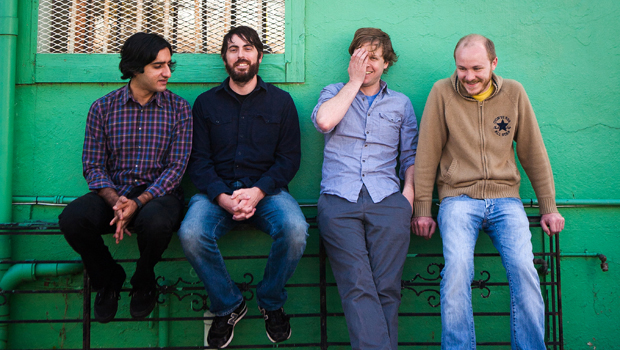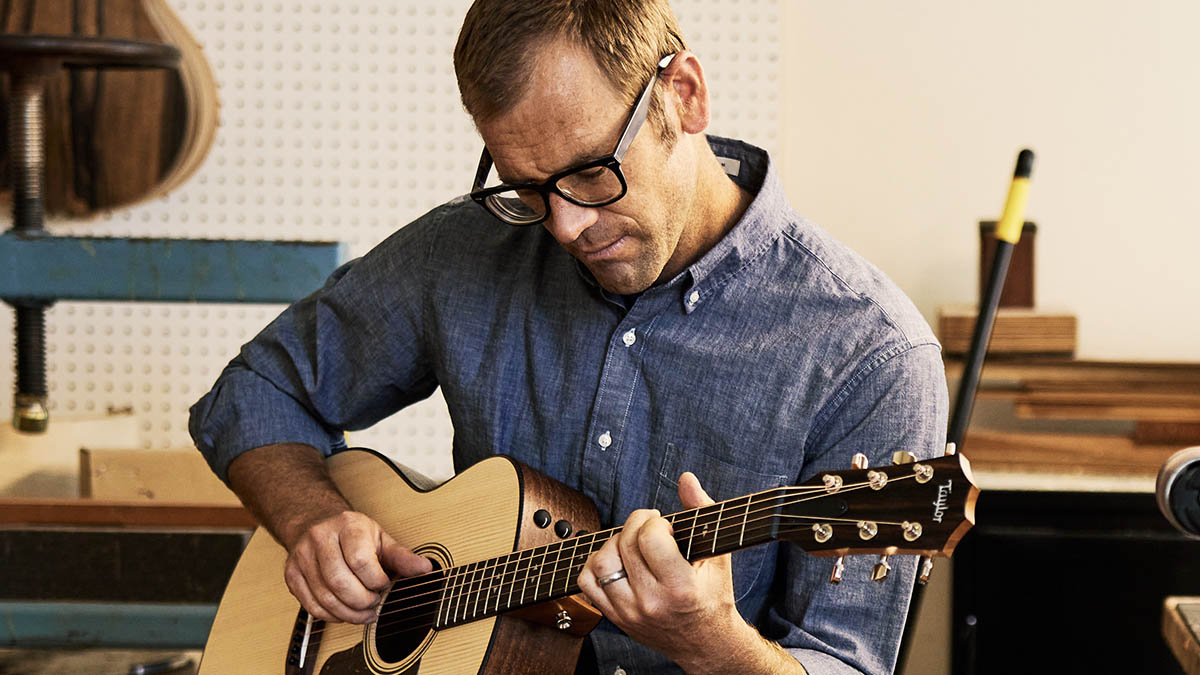
When we last spoke with Explosions in the Sky, fresh from their headlining show at New York City’s famed Radio City Music Hall, the Austin-based instrumental quartet were at the high point of their careers — that is until a few weeks later, when the news came in that their sixth studio album, Take Care, Take Care, Take Care, had landed at No. 16 on the Billboard 200 Chart.
Not bad for a little ol’ band from Texas that writes sprawling, 10-minute instrumentals.
Guitar World caught up with Explosions in the Sky guitarist Munaf Rayani to talk about the new album and the band’s surprising success.
GUITAR WORLD: A lot of people have called your headlining show at New York City’s Radio City Music Hall the biggest show of your careers. Do you agree with that?
MUNAF RAYANI: I think definitely, on our own, that was the biggest show to date. We’ve been lucky to be part of some festivals, and there are just ridiculous amounts of people at those shows. The Radio City show was like a daydream, and not even a specific daydream. Never did we go: “You know, one day we’re going to get to Radio City.” We arrived there, and it was kind of a shock to the system that the type of music that we’re playing — the instrumental, eight- to 12-minute songs — that there’s a big enough audience to fill up a legendary room like Radio City.
How does it feel to have an album land in the Top 20 of the Billboard charts?
It was a great surprise, one of the best surprises of our lives. We hoped the album to do well. You know charts and numbers, we don’t live and die by them, but we definitely pay attention as we would like to see where it lands in this world of music. But for it to be the Billboard charts, the big-boy charts, the everybody charts, if our instrumental, 10-minute-long songs can land at No. 16, I mean, the sun is shining on us, you know.
We got the news about a day or two ago. It was just a great day; we were opening for Arcade Fire, the album’s first week numbers had come in, we were in good company, all of our friends were around. It’s been feeling pretty good, and we’ve been counting our lucky stars on the daily. Not everyone gets to experience it this way, and I hope we continue to, but if it were to all stop tomorrow, I would only remember it favorably.
Let’s talk about Take Care, Take Care, Take Care. I’ve seen reviews mention that there were no synthesizers at all on the album. Can you confirm that?
No, no synthesizers. We use samplers and stuff like that, and we might have … actually I take it back. We might have thrown on some deep layers of just droning chords that helped fill out some of the crescendos or the blaring parts. I think there are some chords that we laid down on a synthesizer but we never highlighted anything or made it a lead instrument.
All the latest guitar news, interviews, lessons, reviews, deals and more, direct to your inbox!
There are some lead parts people might be surprised to know were generated by guitars …
Exactly.
A couple of those appear on one of the stand-out tracks from the album, “Be Comfortable, Creature.” Around 1:45, some notes start fading in and are then cut off abruptly. Was that done with a sampler or with live effects?
That’s the sampler. We took the melody of the song, chopped it, sped it up, reversed it, slowed it down and threw it on some notes so that on the keyboard it would hit different keys, and we used it as a bridge into the next part. It’s the melody of the song itself, just scrambled.
And about a minute later, a more prominent melody comes in that sounds like it’s being played with an EBow.
Yeah, that song in particular definitely highlights the EBow. The first half of the song, I’m kind of running the [sings melody] and then the second half of it, Mark [Smith, guitarist/bassist] picks up and carries that one.
Can you give us an overview of your gear set-up for the album?
It’s pretty standard. I’m playing a Fender Stratocaster, which I love. I’ve been playing on a Fender Strat since I picked up a guitar, and boy, they make a strong guitar because my guitar’s been tossed around a few times and it’s still alive and it still works like a charm. The Fender guitar and Fender amp, those are pretty important to us. As opposed to the other amps and combos out there, for us they offer the embracing, warm sound that we’re after. On the flipside of that coin, they can also keep up with us, with our distortion and our washes of sound. So the Fender is the core, then we run very basic setups. Delay pedals and reverb pedals are also very, very, very important.
What sort of reverb are you using?
We’re using the Boss RB-3. It’s been discontinued so we have to constantly chase it in second-hand shops or on eBay; we even have a couple hidden away in case the ones we’re using go sour. We all have one of those. The next one after that is called the RB-5, which is good, and it does what the RB-3 was doing and more, but it’s different. We just took one step back and kind of chased that RB-3, so that’s a pretty important pedal.
An even more important pedal is the tuner pedal! [laughs]
There three of four types of distortion that we’re all using. A couple of Big Muffs. A friend of our hipped us to some boutique distortion pedals. I’m using a particular one out of Brooklyn by a company called Frantone.
You’ve said in previous interviews that there are no “roles” in the band. How does that play into songwriting? Do you find yourself fitting into roles sometimes without realizing it?
We are who we are, and our personalities come through in the way we play guitar, and the way we are with each other reflects well to how we play guitar together. The guitar lines all intermingle and compliment and guide and follow each other to where we just make these melodies without somebody leading the way. It’s funny: There’s no leader, and we’re just all following each other.
But if Chris [Hrasky, drummer] were to break us down, I bet he would say something like, Michael [James, guitarist] is probably the most proficient among us, so he can run finger-picking guitar lines that will kind of set a path; Mark will add feedbacks and delay sounds and screeches and scrawls that will fill out this canopy of trees; and then I might play a melody that kind of jumps out in an anthemic kind of way. This kind of soaring … not to say that that’s all each of us plays, but it seems to go that way. Mark’s going to color it up, Michael is going to carry the line and I’m going to try to hang over it. Chris is the heartbeat, he’s the lifeline. As we all do this together, we arrive at these completed pieces at eight or nine minutes long, and we really don’t know how we got there (laughs). But we got there.
Is the songwriting generally a democratic process?
Democratic is the ideal of it, but it’s more totalitarian. Everybody has their say, everybody introduces melodies, everyone helps write on those introduced melodies, but if any man is not into what it is we’re doing, then that song gets tossed. We all kind of offer what we can offer, and then everyone builds on top of that.
Your last album was four years ago (2007’s All of a Sudden I Miss Everyone). Do you see the cycle for the next album being shorter?
I think it’s too soon to tell, but the hope is that it’ll definitely be sooner than later that we release our next album. This one just came out last week, so we’re going to give it its fair due and run behind it for the next year or year and a half, then probably go back underground and revisit some of these seeds that we planted with the demos that were left behind for this album.
But four years seems like a big stretch between albums, and I hope that doesn’t happen again. Two years, two and a half years? Right around then, we’ll try to get something new out.
Josh Hart is a former web producer and staff writer for Guitar World and Guitar Aficionado magazines (2010–2012). He has since pursued writing fiction under various pseudonyms while exploring the technical underpinnings of journalism, now serving as a senior software engineer for The Seattle Times.

